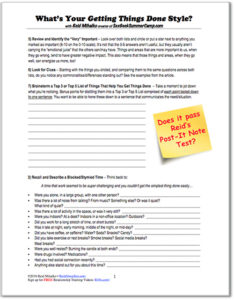 What’s your “Getting Things Done” Style?
What’s your “Getting Things Done” Style?
So many people teach what to do to grow your business, but not many people talk about HOW to go about doing all the tasks that are needed to be done once it grows.
This was a challenge for me in my growing career as “America’s favorite Sex Geek.” And, it’s my hope that this article will help you avoid all the frustration, shame, and self-flaeggelation I had to go through.
 The Solo Sex Ed’preneur Dilemma…
The Solo Sex Ed’preneur Dilemma…
Not every sex educator can afford to hire an assistant or build a team when they launch their business, which means that many of us are solopreneurs at least for a while. We end up doing everything. We become the bookers of our workshops, the social media manager, the negotiator of contracts, our own Webmaster and Copywriter, etc…. And those are just some of the things we need to get done so we can teach/coach/help people!
Then there’s all the followup one needs to get done post-workshop/coaching session/webinar/book launch, so you can wrap everything up and start all over again…
Welcome to owning your own business! 🙂
All of these many, many tasks can feel heavy unless you start to “get the hang of it.” And one of the things that helped me get the hang of things faster and better was recognizing that I had a kind of productivity approach that I’d never noticed before. When I came at my daily business tasks in a certain way, I got more done (and felt great!). When I didn’t, productivity sputtered and floundered (and I would get sucked into a low self-esteem shame spiral).
I would eventually call this my “Getting Things Done” Style.
Knowing your “Getting Things Done” Style (and being aware of what your NOT Getting Things Done Style is) can make a powerful difference in your efficiency, the ease (and pleasure) of your work, and your peace of mind.
First, a quick reminder about the FREE webinar for sex educators… If you want to hear some of the top learning points from this year’s Sex Geek Summer Camp, sign up via the link below to get the info, the recording replay link, the call slides, etc… All for free! (And we like geeking out for free, don’t we?)
The Top 3 Things I Learned At Sex Geek Summer Camp This Year!
ReidAboutSex.com/Top3ThingsILearnedAtCampFreeCall
Click The Link Above to Register for Free Access
 What’s The Cost of NOT Knowing Your Getting Things Done Style?
What’s The Cost of NOT Knowing Your Getting Things Done Style?
The cost of not knowing your Getting Things Done Style is that you’ll burnout sooner, associate helping people with your own pain and suffering, and probably leave the sex ed industry.
For those of us who were raised with “tough it out” mentalities (Three fingers pointing at myself, thank you very much, New England, Protestant upbringing!), our default response is to “double-down” and work harder. Working harder as you fatigue, equals diminishing returns over time, with the default response being… You guessed it: To “double-down” again… And so on…
To prove how committed we are to our cause, and rather than admit that we need to change something, we just stay the course until we collapse.
Sound familiar? This is the exact same advice that got so many of our parents and loved ones stuck in Relationship Hell until they collapsed, isn’t it?
So stop. Take a breath. And ask yourself: “What is my relationship to productivity?”
Self-Expression = More Happiness (Even In Business)
If you’ve been following my work, you’ve probably come across my ideas of Dating Your Species and Cool-Down Styles. I think what brings us happiness in today’s modern world is self-expression and being/feeling self-expressed. And, unless you just got plum lucky, self-expression requires a bit of self-knowledge and awareness.
Knowing geeky things about your self-expression in love and intimacy can dramatically increase relationship satisfaction. One, you can begin to feel more fulfilled living and loving in ways that are congruent to you. Two, because such information reduces drama by allowing you to more consciously pick and invite people into your life who are better fits for your world. Better fits equal less friction and more joy and ease.
Fulfillment paired with joy and ease is a powerful cocktail for happiness.
Similar principles apply to happiness in business and productivity. Being a computer programer might be nifty, but being a sex educator taps in your “life’s calling,” which ups your levels of feeling fulfilled. (Nothing against computer programmers, fyi).
Once you access the calling part, then we need to dial in the ease and joy next, which is where your “Getting Things Done” Style comes in.
Knowing that you have a “Getting Things Done” Style and knowing what it is can make your work-life more joyous because you can significantly lessen drama and friction, making productivity a breeze rather than a grind. And when it comes to fighting the war against sex-negativity and ignorance, anything that we can do that makes our lives smooooooooother and lessens burnout… Sign me up!
Think about it: Less friction means you’re not fighting yourself. That means you end up getting better “gas mileage” from driving yourself as you build your career. That means you up longevity and, chances are, your productivity. This is huge when you do that math.
Feeling less exhausted and more satisfied is going to mean you’ll be in this game longer, with more reserves and enthusiasm to problem solve. Say your problem solving results in you getting 10% more done each week… Now multiply that joy and 10% over the next 5 years… The next decade… How many more lives you will you transform? And with less burnout and more emotional resources and satisfaction… How much more creativity and joy will you have at your fingertips as you greet new clients or speak publicly? Or get that book written? Or finally overhaul your website?
What might the impact on your bank account eventually be?
The Way YOU Get Things Done May Not Be The Way I Get Things Done
Your Getting Things Done Style may be very different from mine, and your style may differ from situation to situation, too. How you get things done best when on a tight deadline might differ from when you’re 6-months out. Writing a book or designing an online program may differ from how you calendar your year or prepare to do taxes.
However, identifying your basic styles can help you tap into inspiration, feelings of empowerment, avoid disasters, and step into your “work flow” in ways that will help you rise up to tackle the things that seemed daunting or out of reach in the past. Our empowerment and enthusiasm from “getting shit handled” in one area of business usually spills over into other areas.
Productivity is contagious.
Tell Me About Your Mother…
Many people learned what “work” and “productivity” looked like from watching their parents, teachers, siblings, etc.
If our mom needed the room completely quiet, no interruptions, and sitting at an immaculate desk to get things done, we may unconsciously try to fit our work habits into her mold. If you’re not as successful as your mom was sitting at a desk, or if you’re desk’s always a mess, you might mentally berate yourself for not being productive or organized. Yes, some of us actually “desk shame” ourselves. (Heaven forbid you ever see my office!)
If dad always blasted music, drank lots of coffee, and pulled all-nighters (while leaving a wake of chaos and crumpled notebook paper in their path), then don’t be surprised if caffeinated late nights with neighbors beating on th
e walls to turn down the music, and you leaving a mess all over the floor “magically” becomes your thing.
Maybe your dad’s way didn’t work, so you picked up the latest best selling productivity book and tried getting things done their recommended way… If it didn’t work for you, did you take it as proof that you were broken. I know I did. Our self-talk is, “The book’s system worked for everyone else, but not me. See? Proof that I’m a failure.”
A teacher or coach who screamed at their class or players to get them to work hard… A soldier who had a drill sergeant a’la Full Metal Jacket… Is it possible that some of those young adults grew up to be managers who yell at their employees to “bring out their excellence?”
Choosing The Exact Opposite Isn’t Necessarily Self-Expression
Then there are those of us who swing completely in the opposite direction of what we grew up around. You never challenge your peers and employees because you don’t want to upset anyone.
Choosing the exact opposite still equals being heavily influenced, which means, many people have copied and pasted, or responded to, what they witnessed when it comes to getting things done. And that means no conscious choice.
What would happen if we took some time to figure out what is the best, most self-expressed and happy-making fit for us?
 Your Life’s Been Leaving You Clues…
Your Life’s Been Leaving You Clues…
Much like in Dating Your Species where I teach discovering your Win-Wins and Bottom Lines by looking at past relationships and friendships, your work life has probably been leaving your clues productivity-wise for what works and what doesn’t. But since no one ever taught us how to see those clues, they remain invisible.
Here’s a simple exercise and a place to start playing detective… Give it a try, will you?
Figuring Out Your Getting Things Done Style!
Before you jump ahead, I recommend you DOWNLOAD and PRINT OUT this handy dandy worksheet for the exercise below. Or, if you’re more of a “I keep everything in a notebook” kind’a person (or don’t have access to a printer), run quick and grab a pen and some paper… I find that writing things down makes this so much easier and I glean more insight.
But that just might be me. 🙂 Either way, give the exercise a try. (It will more than pay off in the future).
1) Recall and Describe a Productive Time – Take a minute with me right now and close your eyes (after you read the instructions, of course!) and think back to:
A time that work seemed to flow easily and effortlessly. A time when you were surprised at how well you worked.
When you’re done tuning in and recollecting, open your eyes, and answer the following questions:
- Were you alone, in a large group, with one other person? ______________________
- Was there a lot of noise from talking? From music? Something else? Or was it quiet?
What kind of quiet? ________________________________ - Was there a lot of activity in the space, or was it very still? _____________________
- Were you indoors? At a desk? Indoors in a non-office location? Outdoors? __________
- Did you work for a long stretch of time, or short bursts? _______________________
- Was it late at night, early morning, middle of the night, or mid-day? ______________
- Did you have coffee, or caffeine? Water? Soda? Snacks? Candy? __________________
- Did you take exercise or rest breaks? Smoke breaks? Social media breaks?
Meal breaks? __________________ - Were you well rested? Burning the candle at both ends? _______________________
- Were drugs involved? Medications? _____________________
- Had you had social connection recently? __________________________
- Anything else stand out for you about this time?____________________________
2) Rate the Importance – Now go back to each of your answers and write down from 0 to 10 how important that aspect feels to you, with 0 being not important and 10 being super important.
3) Recall and Describe a Blocked/Stymied Time – Think back to:
A time that work seemed to be super challenging and you couldn’t get the simplest thing done easily…
- Were you alone, in a large group, with one other person? _________________________
- Was there a lot of noise from talking? From music? Something else? Or was it quiet?
What kind of quiet? ________________________________ - Was there a lot of activity in the space, or was it very still? ________________________
- Were you indoors? At a desk? Indoors in a non-office location? Outdoors? _____________
- Did you work for a long stretch of time, or short bursts? _____________________
- Was it late at night, early morning, middle of the night, or mid-day? _________________
- Did you have coffee, or caffeine? Water? Soda? Snacks? Candy? ____________________
- Did you take exercise or rest breaks? Smoke breaks? Social media breaks?
Meal breaks? ________________________ - Were you well rested? Burning the candle at both ends? _________________
- Were drugs involved? Medications? _____________________
- Had you had social connection recently? __________________________
- Anything else stand out for you about this time? _______________________________
4) Rate the Importance – Now go back to each of your answers and write down from 0 to 10 how important that aspect seemed to you, with 0 being not important and 10 being super important.
5) Review and Identify the “Very” Important – Look over both lists and circle or put a star next to anything you marked as important (6-10 on the 0-10 scale). It’s not that the 0-5 answers aren’t useful, but they usually aren’t carrying the “emotional juice” that the others can/may have. Things and areas that are more important to us, when they go wrong, tend to have greater negative impact. This also means that those things and areas, when they go well, can energize us more, too!
6) Look for Clues – Starting with the things you circled, and comparing them to the same questions across both lists, do you notice any commonalities/differences standing out?
Some examples:
- If it was quite when you got a LOT done, and there was construction going on outside your window on the day when you couldn’t accomplish anything…
- You got tons accomplished in the middle of the night vs. just before lunch you seemed worthless…
- Productive times included working in groups and being outdoors vs. working solo in an office…
7) Brainstorm a Top 3 or Top 5 List of Things That Help You Get Things Done – Take a moment to jot down what you’re noticing. Bonus points for distilling them into a Top 3 or Top 5 List comprised of each point boiled down to one sentence. You want to be able to hone these down to a sentence that communicates the need/situation.
you’re noticing. Bonus points for distilling them into a Top 3 or Top 5 List comprised of each point boiled down to one sentence. You want to be able to hone these down to a sentence that communicates the need/situation.
Does it pass my Post-It Note Test? Meaning: If it’s not concise enough to fit on a single Post-It Note, then it needs more work.
Why do I like this test? Honing it down so that it fits on a Post-It Note will make it more clear, which will make it easier for you to remember, AND easier for you to communicate it to others (and for them to understand it)!
BONUS BENEFIT: You can take the actual Post-Its and stick them where you’ll see them as reminders!
Congratulations, now you have found your words for beginning to describe your Getting Things Done Style! Good on you, Sex Geek!
Admit that We’re Only Looking for Clues, Not Certainties
I admit this is just a quick exercise with only two examples, a rough rating system, and quick conclusions. This is just the beginning of self-discovery, so take what you learn about your self as the beginning of a lifetime journey rather than a “Eureka! I’ve got THE answer!” moment.
There’s no way we can account for unknown variables, so be curious rather than certain as you explore further. Maybe you got lots done at 3am because it was the only time the baby was asleep and it had nothing to do with you being a night-owl.
And… We are always growing and changing as beings. Your Getting Things Done Style may shift and change with you over time. So it’s always good to revisit yourself and your needs periodically.
What I do know is that starting to look for your Getting Things Done Style patterns and clues, and doing this same exercise multiple times, recalling several productive and blocked times, rating them and honing the words to describe will allow you to begin to “stack the deck in your favor” and move towards situations that will naturally be more conducive to your creativity and productivity.
For instance, if working with someone is very important to you (a 8, 9 or 10), but music can be a distraction… If your work buddy LOVES music playing, is there a type of music that will work well for both you? Or can your buddy or you use headphones?
Once you know what allows easy work flow for you, and what holds you back, you can look for good overlaps and nurture a great work space and environment for yourself!
If you want to work with someone(s) and they don’t know their Getting Things Done Style, guess what? You know how to do this exercise! Before you start working together, why not help them identify what their style is as a means of assessing whether THEY are a good fit for YOU?
Then, because everyone has more clarity about how they work and what’s a good fit, you’ll each have better words to talk about your needs and best fits, which can really help make negotiating and discovering win-win situations easier.
IMPORTANT NOTE: No one way is “more evolved” than another way. What’s evolved is you building a business and work-life that creates ease and joy for you! That’s evolved.
Am I a Bad Person If I Ignore the Signs?
If you’re like me, there’s a good chance you won’t believe or follow your own advice at first. It’s okay. You’re not a bad person, but consider trying what you discover rather than ignoring it. Trust me on this one. Why? It’ll just save you more frustration.
And, knowing your styles doesn’t mean you can’t ever “violate” or make exceptions. When you do, at least you’ll be going into things with your eyes open a tad more, and you’ll have your words so you can give everyone involved a heads up. [In a future article, I’ll share my thoughts on creating powerful policies in your career and business, and the even more important approach to making powerful exceptions! To make sure you don’t miss that, be sure you’re on my Sex Geek Pro List to get future business tips and career advice!]
Why Not Just “Tough It Out?”
You might be asking yourself, “Why Go To All this work in the first place? Why not just tough it out, Reid?”
Here’s why…
Working harder, especially over 5, 10, 25 years, doesn’t necessarily mean you touched more lives or paid more bills. In fact, isn’t “toughing it out” and work harder the exact same advice that got so many of our parents and loved ones into Relationship Hell where they were miserable?
Misery =/= productivity.
Identifying and avoiding bad fits is a great way to get more things done! (Plus, if you’re a nerd like me, people having their words and clarity for what they like is damn sexy! Yes, and that holds true for romantic relationships, too! See? It’s all relational, ain’t it?)
Feel free to email me at support@ReidAboutSex.com and let me know what you noticed, or if there were things that you think I should add to the list of questions. I can’t reply to everyone, but I do read every email.
I hope this helps your productivity and lets you get more done with less effort. This work and your calling is so vital and needed in the world. Thank you for doing what you do!
xxREiD

